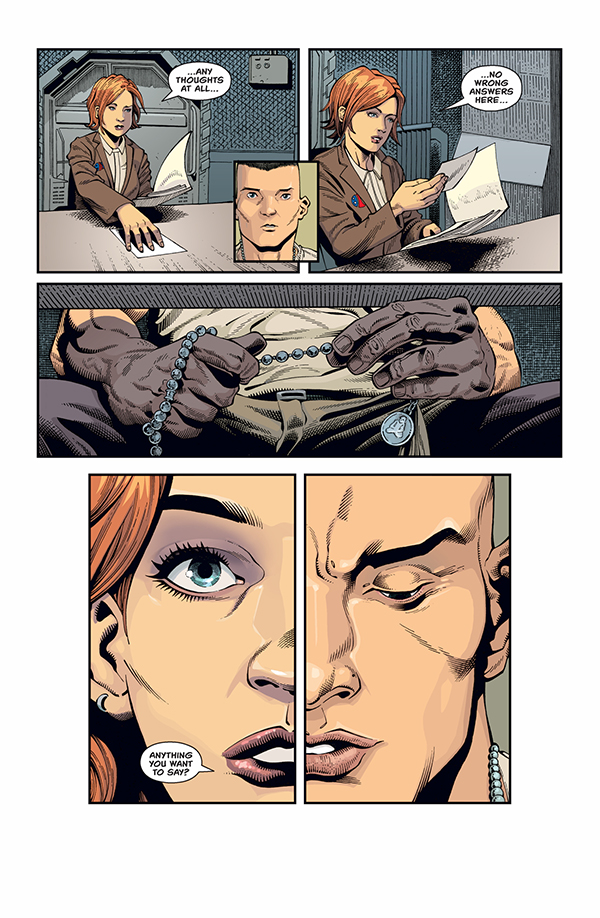Dark Horse’s Latest Brian Wood Outing Will Be a Lot of Fun If It’s Given Room to Breathe
LOOK AT MY FANCY HELMET. Image: Dark Horse Comics
by Patrick Greene
I’ll come right out and say it: I thought Aliens: Resistance was awful. I found the visuals inconsistent and confounding, the storytelling rushed and a little bit stupid, the characters interchangeable and uninteresting.
Which was borderline shocking to me, coming on the heels of Brian Wood’s previous outing (the excellent Defiance, which you can grab in two nicely priced collected volumes).
Aliens: Rescue, whose first issue dropped earlier this month, is off to a technically solid (if slightly uninspired) start. Picking up years after the events of Resistance (did I mention I didn’t like that one?), Rescue centers on Alec Brand—a minor character, er … rescued by Zula Hendricks and Amanda Ripley during the events of Resistance.
SOMETHING’S WRONG WITH MY FACE. Image: Dark Horse Comics
He’s grown into a Man With a Tough Looking Haircut, and as such he’s been brought into the fold of the Colonial Marines. He appears to miss/appreciate Amanda and Zula, and to have been scarred by the events of his childhood. He also has an interesting backstory, which is unfortunately glossed over in a handful of panels (wonderfully colored by Dan Jackson) instead of being given time to unspool.
And that brings me to my main complaint with these limited arcs: why do they have to be so short? Why was Dust to Dust compressed to four issues? Why was Dead Orbit (my favorite Dark Horse title in years) squeezed into four issues? And how did James Stokoe manage to pull that format off?
And why did Aliens: Resistance, which, again, was awful, try to fit two or three movies’ worth of exposition into four issues?
Aliens: Rescue, which isn’t bad by any means, is already having to race along just to fit the plot into a tiny bucket. Fox, Dark Horse, et al. are clearly trying to make us invest in this new generation of characters. And I love that idea, because Zula is wonderful, Amanda (at least in Isolation) is great, and Alec is … something? But give us time with them. Time that isn’t purely expositional. The best parts of Aliens: Rescue #1 are psychological: Alec remembering his childhood on Earth, and the Marines fighting a horde of (nicely designed) creatures while Alec deals with PTSD.
Give us time to appreciate that. Give us time to get to know them.
Brian Wood clearly knows what he’s doing. He can tell a great story, and he’s proven as much with Defiance (which breathed over a much longer arc). Kieran McKeown, whom I’ve never heard of before but whose art I like quite a bit, brings a nicely solid skillset to the title. It’s not particularly expressive (or particularly interesting), but it tells a cohesive story in a way that’s easy to follow and enjoyable to look at.
The feel of Rescue is similar to the feel of Resistance: these are NOT horror titles. This isn’t James Stokoe. These are action sci-fi comics. What I like about Rescue is that it feels more aware of that fact and more at home with that aesthetic. It reads like a slightly more involved version of those mini-comics that came with Kenner figures in the nineties.
And that isn’t a bad thing at all. It’s just a thing, and as such it needs to inform decisions about tone and pace etc. If Aliens: Rescue wants to succeed, it needs to embrace what it is and enjoy itself.
Give us action. Give us colorful space adventures with the Colonial Marines. Give us a protagonist with a backstory that means something, and give us an arc that can buttress and tie back around to what we’ve had from Wood and Co. over the past few years.
Aliens: Rescue #1 isn’t a masterpiece, but it’s a step in a direction I can get onboard with.
Rating: 3/5


